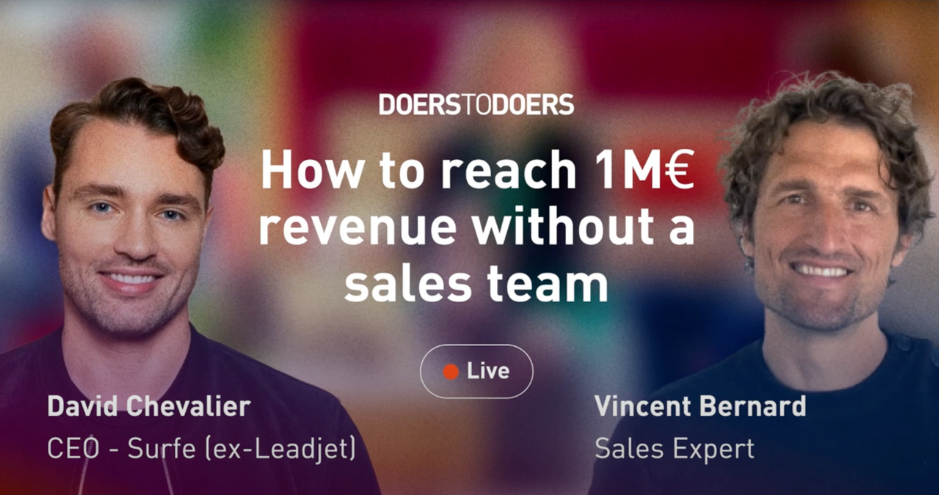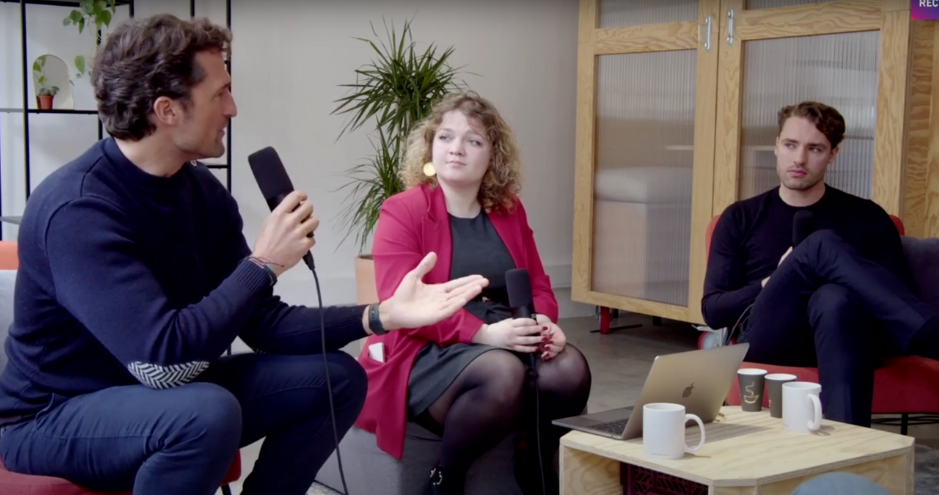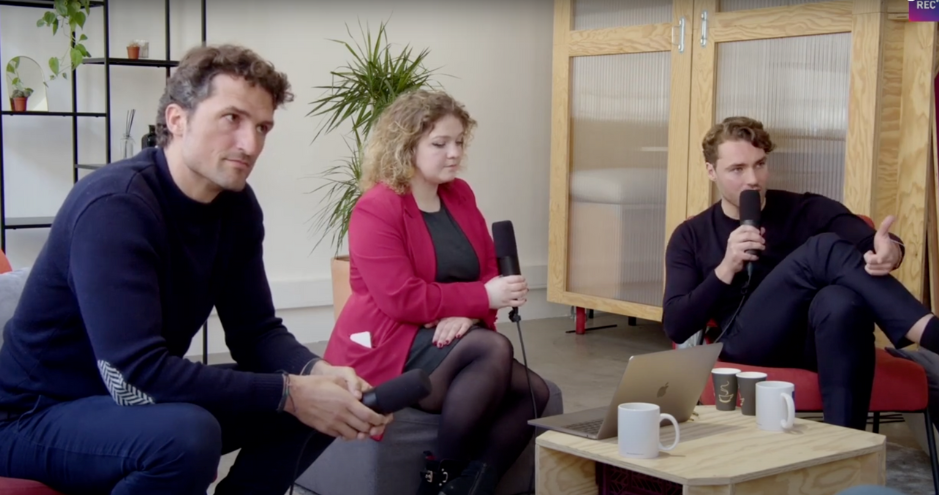How to Reach €1 Million in Revenue Without a Sales Team
How to Reach €1 Million in Revenue Without a Sales TeamReaching €1 million in revenue doesn’t mean you have to spend a fortune on a dedicated sales team! This is what David Chevalier, co-founder of Surf (formerly LeadJet), a startup that connects LinkedIn to CRMs, explained during one of the "Doers to Doers" sessions hosted by the Incubateur HEC Paris, part of the HEC Paris Innovation & Entrepreneurship Institute. “We had to get deals signed but we had no money, no people to hire… We had no other choice than looking for alternative ways”, he explains. Alongside Vincent Bernard, an expert who has advised numerous entrepreneurs on their sales strategy, they shared their experience. Here are eight key takeaways from their discussion.

1. Leverage strategic partnerships
First insight: Develop powerful partnerships, and always make sure you understand not only your own product but also the ecosystem in which it operates, and the needs of potential partners.
Advice in Action: David recalls: "For us, it was clear that we needed to get closer to HubSpot. We analyzed how HubSpot generated revenue and what their value metric was…", which turned out to be the number of contacts. With Hubspot, the more contacts you have in the CRM, the higher your plan is. David’s company, Surf, proposed a one-click solution to HubSpot for instantly adding contacts into their system. "We told HubSpot, 'This is what we're bringing to the table: a quicker way to enter contacts. Look at Surf's usage after three months.'" As a result, HubSpot saw a significant increase in their revenue. This is how Surf began to establish a partnership with one of the leading CRM platforms.
David also explains a hack to save time to develop partnerships. “With partnerships, you often have to do 100% of the work. For HubSpot, we suggested writing an ebook about Social Selling. But honestly, writing a 90-page e-book was too much for me. We decided instead to collaborate with five influencers to write a specific part of the ebook, we did our part too of course. Then, we presented the finished product to HubSpot, who agreed to publish it.
2. Find and highlight your uniqueness
Second insight: Challenge yourself to find out what your singularity is, as it can become your unique selling proposition, and help you stand out in a competitive market.
Advice in action: Make cold calls to introduce your agency. You will mostly get that same answer: “OK, like any other company?”. If you carry on talking about the technology you use, they will once again tell you “OK, just like any other agencies…” This exercise pushes you to find out what really makes you different from your competitors.
David shares the example of a family agency he works with: "We have this very specific web agency where we take the benefits from all the generations: two brothers and a father. That is something different."
3. Specialize and clarify your message
Third insight: Stop trying to do too many things!
Advice in action: Do you enjoy going to restaurants where they sell American food, Indian food, Italian food, and so on…? David asks. Nobody does. It is the same in business. Focus your efforts on what you do best, and just sell it. This will also help you clarify your offer for potential customers. “It's very important to be able to explain in one or two sentences exactly what you do, and why it has a lot of value for people," he adds.

4. Target the right audience
Fourth insight: Don't talk to everyone, only talk to people who can understand.The right audience will naturally understand the value behind your product.
Advice in action: David shares the example of a data analytics company that initially struggled to sell their solution to e-commerce businesses because they were all using Google Analytics already, and for free… Soon enough, they decided to address data consulting companies, who immediately understood the value of their product. "Those people were like, 'From the moment you speak, I understand the value of what you do. And yes, we will sell it on your behalf.' And that worked quite well," he recalls.
One of the mistakes Vincent made in the past was to spend too much time on tasks that didn’t yield significant returns, particularly with smaller clients. Establish metrics and a timeline: “If it takes too much time and it's not a big client, the return won't be big. Forget about it.”
5. Use customer discovery as a sales approach
Fifth insight: Avoid appearing too sales-oriented. Instead, find a way to engage naturally with your potential customers.
Advice in action: "What we actually did was customer discovery with Google and AWS,” David explains. The idea was to come to them as a product manager saying: “Hey, we want to build a product, and you can be part of it, or hey, we’ve noticed this new trend, maybe it could fit with what you are doing?" With this inclusive method, anyone can engage in a conversation with potential customers without the immediate pressure of a sale. It creates an opportunity for co-creation and engagement that can naturally lead to a business relationship, especially if you are a startup with a perfectable product.
David shares how they acquired their first customers: "We reached out in Facebook groups with the message, 'Hey, we're currently developing a new product and are looking for beta testers to join us.' About 25 to 30 people responded and collaborated with us to develop the product. It was a great experience! Today, they are still our customers."
6. Cultivate authentic relationships
Sixth insight: Once you’ve engaged with a potential customer, make sure to be genuinely caring.
Vincent emphasizes that sales are fundamentally about building relationships: "You're not selling to companies, you're selling to people." He explains that there are two ways to establish these connections: through a one-on-one relationship or a one-to-many relationship (what influencers or YouTubers do). In both cases, the key is to demonstrate genuine interest in the other party.
Advice in action: "The best way to show that you care about someone is by following up, using a CRM of course." Vincent also shares a personal anecdote to illustrate how small gestures can strengthen a relationship: "Last week, I spoke to a director of a big agency. He told me he was making honey on weekends. So yesterday at Saint-Lazare station, I saw some people selling honey. I just took a picture and sent it to him, and it was just nice.” He concludes: “Relationships are all of these little things that do nothing but make a world of difference.”

7. Constantly test and iterate
Seventh insight: Testing and iterating, which allow you to discover new sales opportunities and continuously optimize your sales strategy.
Advice in action: "There are many ways to sell your product. All you have to do is test, test and test again all the time," emphasizesVincent. He recommends a systematic approach: "It's like all go-to-market strategies. Try three new things every week, and at the end of the week, evaluate which one yielded the best results."
David compares it to a screwdriver, which means focusing on perfecting individual elements of a product before moving on to the next. Instead of trying to build a comprehensive toolbox with too many features from the start, aim to perfect one screw at a time to avoid any value gap.
8. Use marketing creatively
Eighth insight: Create a sense of urgency and exclusivity to boost your sales and community engagement.
Advice in action: David quotes the strategy of one of his friends in the fashion industry in Frankfurt who launches what he calls ‘seasons’: Season one, Season two, etc. “By doing so, it shows that the series is limited.” Maybe it’s just a slight change in the jacket, but still this limited ‘drop' approach creates a community feeling inside. Another example could be providing early access to certain features when selling software.
9. Explore all media opportunities
Ninth insight: Don’t limit yourself to traditional sales channels. Instead, explore all media opportunities to increase visibility.
Advice in action: "Maybe in your list, one of them will be going on a TV show, such as the French show 'Who wants to be my partner'. Okay, why not? Push for that one!”, suggests Vincent. It is original and the audience is wide.
Reaching €1 million in revenue without a traditional sales team is a tremendous challenge, but not an insurmountable one! By combining all of these insights to drive organic sales, you too can create new market opportunities. Last but not least, don’t forget to share your own tips too!
Watch the full Doers To Doers:
About Doers to Doers
Unlike traditional conferences or theoretical masterclasses, Doers to Doers is characterized by direct and interactive exchanges with experts and other entrepreneurs who have already overcome similar challenges.
This peer-to-peer learning allows participants to ask specific questions and receive answers based on real-life experiences, without the usual academic or commercial filters.
About Incubateur HEC Paris
The Incubateur HEC Paris is a bespoke, customizable, and participatory startup support program. It leverages all the resources of the HEC ecosystem to assist talented entrepreneurs. Located at the heart of Station F, the largest startup campus in the world, the program aims to enable entrepreneurs to achieve in 3 months what they would typically reach on their own in 1 year.
About the HEC Paris Innovation & Entrepreneurship Institute
The institute supports entrepreneurs from all walks of life. Through our Incubation & Acceleration, Deeptech, and Social Entrepreneurship centers, we help students with innovative ideas, budding startups or unicorns on the rise, accelerating SMEs, large transforming companies, and social or environmental entrepreneurs to develop effectively and with impact. Here, the entire entrepreneurial ecosystem of HEC Paris converges to allow you to Make it Happen, Make it Big.